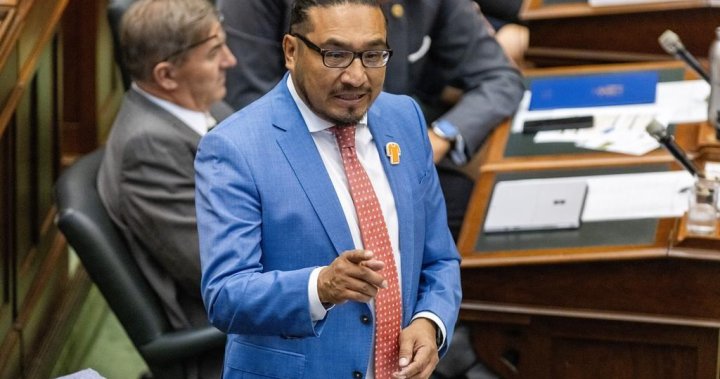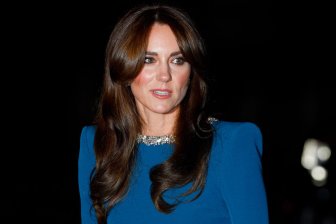The Deputy Leader of the Ontario NDP, Sol Mamakwa, blasted the Ford government Tuesday, suggesting it is failing to protect vulnerable Indigenous youth in the province.
But the Minister of Children, Community and Social Services Michael Parsa dismissed the claim, arguing that his Tory government is already working to better protect all children and youth in the province.
The exchanges took place during question period at Queen’s Park, as Ontario lawmakers reacted to a year-long Global News investigation into the child-welfare system that revealed allegations of targeting and mistreatment of Indigenous youth by for-profit group homes.
NDP MPP Mamakwa demanded immediate action from Premier Doug Ford’s Progressive Conservatives to better care for kids that enter the child welfare protection system, citing the targeting and mistreatment allegations Global revealed.
“Our children must be treated as human beings when they are in care … [It] is very clear that this government has failed them,” Mamakwa told the legislature.

The Global News investigation uncovered how northern First Nations youths from remote communities are allegedly targeted by some for-profit group home companies because their owners can charge more for Indigenous children or because the kids provide a steady source of revenue, according to interviews with more than 50 former group home workers, former children’s aid employees and child-welfare experts.
The results are experiences some likened to the abuse that took place during the residential schools era, according to some workers, child-welfare experts and youths.
“These companies see our children and youth as a steady source of revenue, as cash cows,” said Mamakwa, the MPP for Kiiwetinoong in northwestern Ontario, and a residential school survivor.
He has been an outspoken critic on many issues facing First Nations communities like the overrepresentation of Indigenous youth in the child welfare, the youth suicide crisis, and health issues facing the North.
Minister Parsa, the Progressive Conservative MPP for Aurora—Oak Ridges—Richmond Hill declined to be interviewed during the Global News investigation and has not yet responded to a subsequent interview request since the investigation was published.

During question period, Parsa said his government was working to “protect every single child and youth in our province.” He claimed his ministry has boosted its oversight efforts.
Breaking news from Canada and around the world
sent to your email, as it happens.
“We created 20 new inspector positions across the province. We increased the number of inspections across homes,” Parsa said.
“It’s the moral and legal obligation of every provider to make sure they protect children and youth,” Minister Parsa said. “We will hold them to account every single time.”
Parsa said his ministry also has proposed changes to the Child, Youth and Family Services Act that would allow inspectors to fine anyone caught breaking child-welfare laws, like group home or foster care operators, up to $1,000 per day of non-compliance to a maximum fine of $250,000.
The proposed fines were announced in July 2023. They still have not been enacted.
Meanwhile, Federal Minister of Indigenous Affairs Patty Hajdu said in a statement that Ottawa would be “ready to help the province with an investigation should they pursue one.”
“We’ll look at every tool available to us to make sure those children and youth are protected,” Parsa told Global News at Queen’s Park.
In northern Ontario, Indigenous child-welfare agencies care for kids who have experienced family crises or abuse or have complex needs.

These agencies serve some of the most resource-starved communities located near the Manitoba border all the way up to Attawapiskat on James Bay, which can lack basic services like housing, running water, or mental health care.
Faced with few options, these Indigenous children’s agencies are often sent to group homes thousands of kilometres away in cities in southern Ontario — separating them from family, friends and culture.
A Global News analysis of spending data by children’s aid societies (CAS) across Ontario revealed that northern Indigenous agencies are paying higher daily fees for such care than their non-Indigenous counterparts.
On average, northern Indigenous children’s aid societies paid 26 per cent more per day for a child to live in a group home, not run by a CAS, compared with their non-Indigenous counterparts between 2012/2013 and 2021/2022.

This discrepancy meant Indigenous children’s agencies in northern Ontario spent nearly $28 million more over 10 years than if they’d been charged the average rate paid by non-Indigenous agencies across the province.
Group home companies contacted by Global News rejected any comparison to residential schools and denied they are targeting Indigenous kids from northern communities for profit.
The companies said Indigenous youths are placed in their group homes and facilities by children’s aid workers from their home communities and that their care isn’t funded differently than services offered to other youth.
The Ontario NDP said in a subsequent statement that the Ford government should act to stop the “predatory practice” of some for-profit group homes who allegedly target Indigenous youth.
“Children in Northern Ontario are being sent thousands of kilometres away from home to a place where they are viewed as a paycheck and are vulnerable to abuse and neglect,” Mamakwa said in the statement.
“Our children and youth are not dollar signs – they are human beings who must be treated with care. This has to stop.”
© 2024 Global News, a division of Corus Entertainment Inc.




